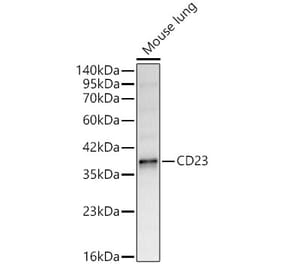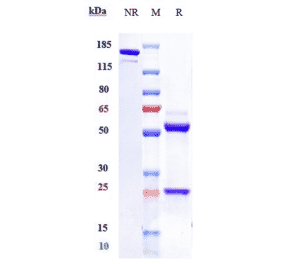+1 (314) 370-6046 or
Contact Us - Argentina
- Australia
- Austria
- Bahrain
- Belgium
- Brazil
- Bulgaria
- Cameroon
- Canada
- Chile
- China
- Colombia
- Croatia
- Cyprus
- Czech Republic
- Denmark
- Ecuador
- Egypt
- Estonia
- Finland
- France
- Germany
- Greece
- Hong Kong
- Hungary
- Iceland
- India
- Indonesia
- Iran
- Ireland
- Israel
- Italy
- Japan
- Kazakhstan
- Kuwait
- Latvia
- Lithuania
- Luxembourg
- Macedonia
- Malaysia
- Malta
- Mexico
- Monaco
- Morocco
- Netherlands
- New Zealand
- Nigeria
- Norway
- Peru
- Philippines
- Poland
- Portugal
- Qatar
- Romania
- Russia
- Saudi Arabia
- Serbia
- Singapore
- Slovakia
- Slovenia
- South Africa
- South Korea
- Spain
- Sri Lanka
- Sweden
- Switzerland
- Taiwan
- Thailand
- Turkey
- Ukraine
- UAE
- United Kingdom
- United States
- Venezuela
- Vietnam

![SDS-PAGE - Anti-CD23 Antibody [FCER2/6887] - BSA and Azide free (A278189) - Antibodies.com](https://cdn.antibodies.com/image/catalog/278/A278189_1.jpg?profile=product_top)
![Immunohistochemistry - Anti-CD23 Antibody [FCER2/6887] - BSA and Azide free (A278189) - Antibodies.com](https://cdn.antibodies.com/image/catalog/278/A278189_2.jpg?profile=product_top)
![Immunohistochemistry - Anti-CD23 Antibody [FCER2/6887] - BSA and Azide free (A278189) - Antibodies.com](https://cdn.antibodies.com/image/catalog/278/A278189_3.jpg?profile=product_top)
![Protein Array - Anti-CD23 Antibody [FCER2/6887] - BSA and Azide free (A278189) - Antibodies.com](https://cdn.antibodies.com/image/catalog/278/A278189_4.jpg?profile=product_top)
![SDS-PAGE - Anti-CD23 Antibody [FCER2/6887] - BSA and Azide free (A278189) - Antibodies.com](https://cdn.antibodies.com/image/catalog/278/A278189_1.jpg?profile=product_top_thumb)
![Immunohistochemistry - Anti-CD23 Antibody [FCER2/6887] - BSA and Azide free (A278189) - Antibodies.com](https://cdn.antibodies.com/image/catalog/278/A278189_2.jpg?profile=product_top_thumb)
![Immunohistochemistry - Anti-CD23 Antibody [FCER2/6887] - BSA and Azide free (A278189) - Antibodies.com](https://cdn.antibodies.com/image/catalog/278/A278189_3.jpg?profile=product_top_thumb)
![Protein Array - Anti-CD23 Antibody [FCER2/6887] - BSA and Azide free (A278189) - Antibodies.com](https://cdn.antibodies.com/image/catalog/278/A278189_4.jpg?profile=product_top_thumb)
![SDS-PAGE - Anti-CD23 Antibody [FCER2/6887] - BSA and Azide free (A278189) - Antibodies.com](https://cdn.antibodies.com/image/catalog/278/A278189_1.jpg?profile=product_image)
![Immunohistochemistry - Anti-CD23 Antibody [FCER2/6887] - BSA and Azide free (A278189) - Antibodies.com](https://cdn.antibodies.com/image/catalog/278/A278189_2.jpg?profile=product_image)
![Immunohistochemistry - Anti-CD23 Antibody [FCER2/6887] - BSA and Azide free (A278189) - Antibodies.com](https://cdn.antibodies.com/image/catalog/278/A278189_3.jpg?profile=product_image)
![Protein Array - Anti-CD23 Antibody [FCER2/6887] - BSA and Azide free (A278189) - Antibodies.com](https://cdn.antibodies.com/image/catalog/278/A278189_4.jpg?profile=product_image)
![SDS-PAGE - Anti-CD23 Antibody [FCER2/6890] - BSA and Azide free (A278185) - Antibodies.com](https://cdn.antibodies.com/image/catalog/278/A278185_1.jpg?profile=product_alternative)
![Immunohistochemistry - Anti-CD23 Antibody [RM406] (A121425) - Antibodies.com](https://cdn.antibodies.com/image/catalog/121/A121428_1.png?profile=product_alternative)
![Immunohistochemistry - Anti-CD23 Antibody [FCER2/4395R] - BSA and Azide free (A251712) - Antibodies.com](https://cdn.antibodies.com/image/catalog/251/A251712_1.jpg?profile=product_alternative)
![SDS-PAGE - Anti-CD23 Antibody [FCER2/4918] - BSA and Azide free (A278188) - Antibodies.com](https://cdn.antibodies.com/image/catalog/278/A278188_1.jpg?profile=product_alternative)

![Immunohistochemistry - Anti-CD23 Antibody [FCER2/3592] (A248529) - Antibodies.com](https://cdn.antibodies.com/image/catalog/248/A248529_1.jpg?profile=product_alternative)
![Western Blot - Anti-CD23 Antibody [ARC0596] (A306068) - Antibodies.com](https://cdn.antibodies.com/image/catalog/306/A306068_1.jpg?profile=product_alternative)


![SDS-PAGE - Anti-CD23 Antibody [FCER2/6887] (A277601) - Antibodies.com](https://cdn.antibodies.com/image/catalog/277/A277601_1.jpg?profile=product_alternative)
![Immunohistochemistry - Anti-CD23 Antibody [FCER2/3592] - BSA and Azide free (A251711) - Antibodies.com](https://cdn.antibodies.com/image/catalog/251/A251711_1.jpg?profile=product_alternative)
![SDS-PAGE - Anti-CD23 Antibody [FCER2/6890] (A277597) - Antibodies.com](https://cdn.antibodies.com/image/catalog/277/A277597_1.jpg?profile=product_alternative)